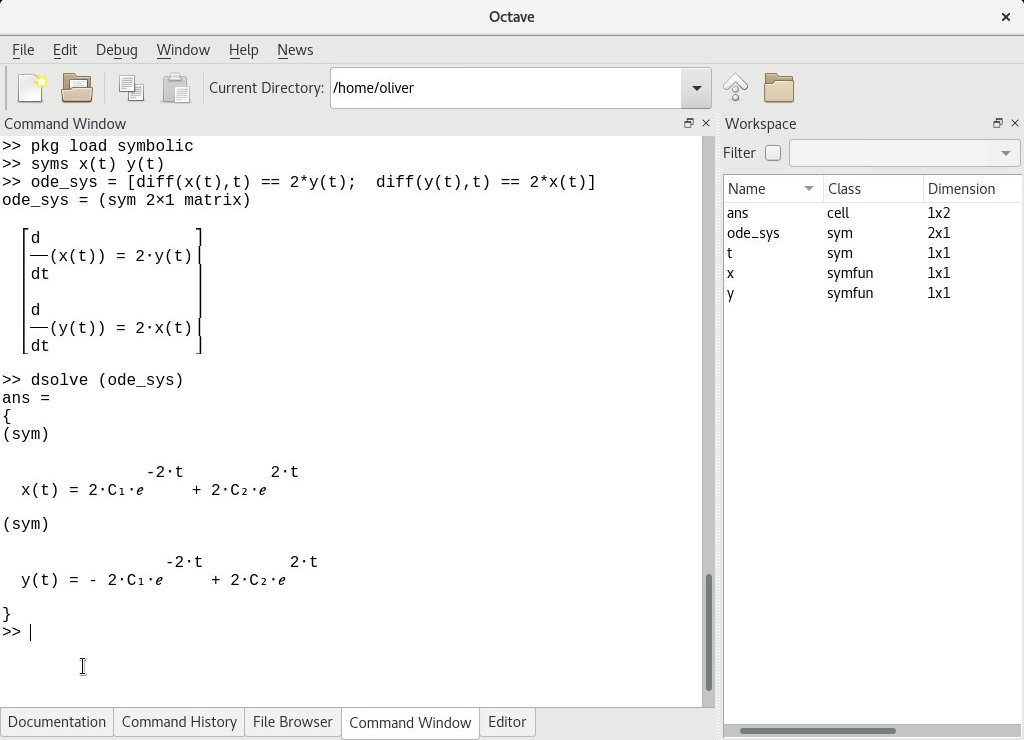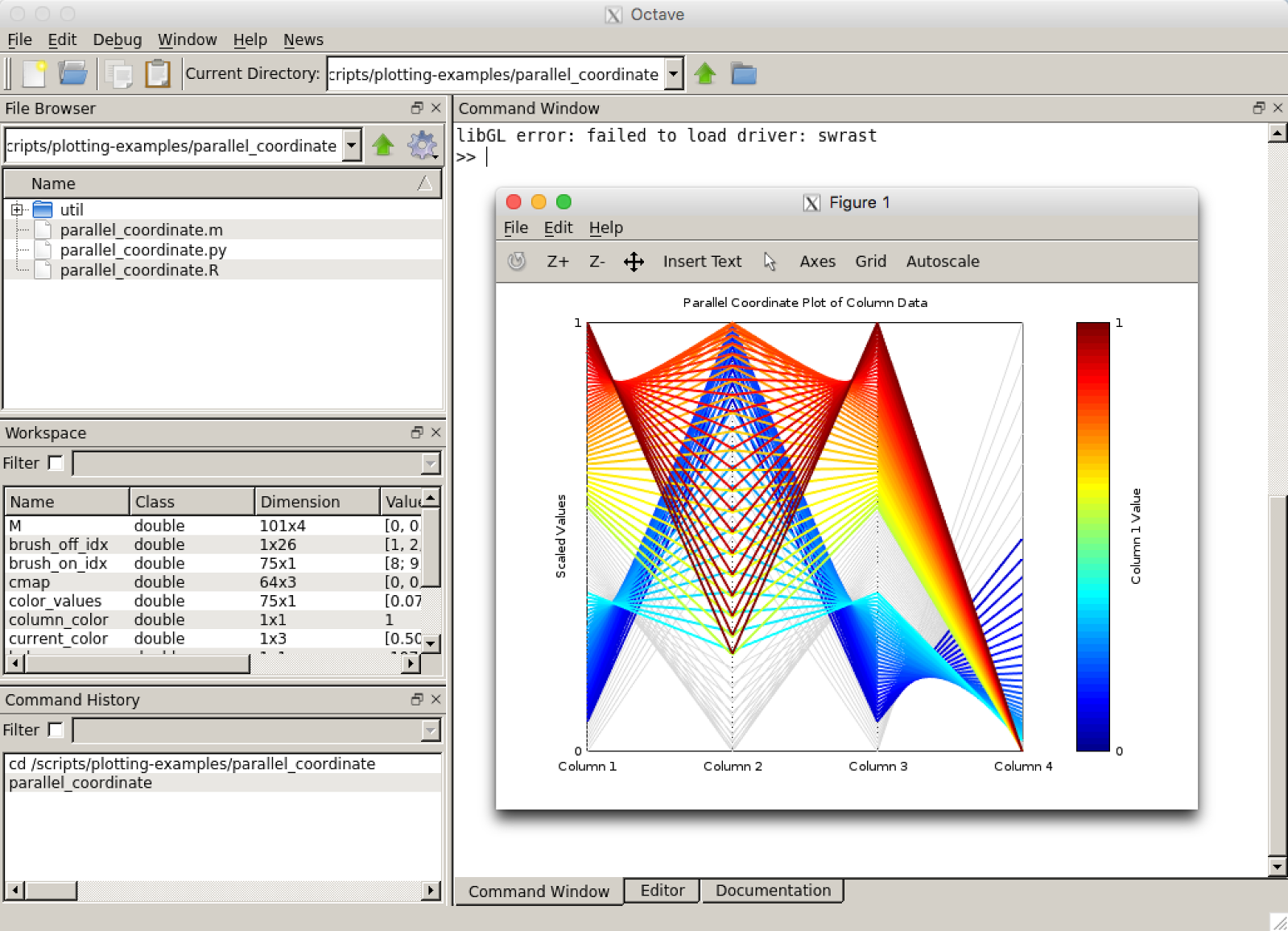

Octave allows indexing of temporary variables. This allows to create try-catch-finally structures for error handling. Octave has not only try-catch construct but also unwind_protect inspired by Lisp. Octave’s rules of lines continuations are less strict: they require explicit continuations only when the lines are ambiguous. Octave allows and recommends to use specific block ends: endif, endfor, endwhile etc. ^= ! != ++ -.įunctions can be defined both in scripts and in the interpreter itself (MATLAB requires that functions are defined in special. Octave adds C-like operators += -= *= /= \= ^=. Strings can be both single-quoted and double-quoted (MATLAB allows only single quotes). This can happen because of compatibility or licensing.

It is a common situation for a binary distribution of a freely available package, such as NumPy, GNU Octave, R, etc, to not be linked against the highest performance BLAS implementation available. Octave syntax repeats the one of MATLAB in most cases, but extends it with some new possibilities: Thus, the bundled-in BLAS version, which came with GNU Octave distribution, is not efficient. The scripts in this language are interpreted. Since then it is distributed under GNU GPL license. In 1997 it became GNU Octave, i.e., it joined GNU Project.
Gnu octave software#
In 1992 it became a separate software product, and started to be developed as such.
Gnu octave code#
**This document has been updated to meet the current required format for the NI Code Exchange.**Įxample code from the Example Code Exchange in the NI Community is licensed with the MIT license.GNU Octave (named after the former professor of lead developer) is a system for numerical computations which uses a high-level programming language compatible with MATLAB.ĭevelopment of Octave started in 1988 initially it was intended for use in chemical reactor design course. UPDATE! this is deprecated, see better interface: GOLPI at Set the directory of “multiply.m” is saved in the “Script/function directory path” file directory control.Set the file path of “octave.exe” in the “Octave exe file path” file path control.Unzip the attached folder to your computer.I think there should be simpler way to communicate with octave by means of pipes (OpenG pipes?), possibly I will explore this possibility sometime. Let me know if you like or dislike (and why) "octave_exec.vi".

Gnu octave update#
Let me know of any encountered problems, so I can update this simple help. The source code is described as follows:ĭisp('this text is not displayed in the case filter match is set to R*E*S*U*L*T*= string (stars inserted to prevent false indication)') This script demonstrates simple multiplication. In the case of error, call string of Octave is sent to the error description, so you can copy it and test it manually from windows console. Octave errors are parsed in a simple way to create LabVIEW error, Octave warnings are ignored. To remove unwanted output, you can apply filter keyword, and only stdout output after the keyword will be returned. Usually Octave creates a lot of stdout output when starting. Octave is called quietly by means of "System Exec.vi" in "octave_exec.vi".
Gnu octave install#
You should not install GNU Octave version 4.x or later to execute this example because “System Exec.vi” returns the value by unexpected process. You can download and run installer from SourceForge (installer includes GNU Octave bundled with OctaveForge packages and Graphical User Interface):ĭepending on your system you could need Microsoft Visual C++ 2010 Redistributable Package (x86) libraries:Īfter installation, Octave executable ("octave.exe") should be installed (depending on your operating system and GNU Octave version) in following directory: This example uses GNU Octave version 3.6.2. GNU Octave installation:įirst of all, you have to install GNU Octave. So, I created a simple vi to call GNU Octave in Windows OS, to read stdout and stderr and to return results and/or errors. by "System Exec.vi", but the use can be tricky without comfortable Linux pipes. Unfortunately, Octave is not directly supported by NI. Or you can use GNU Octave - open source and free software with almost the same syntax as MATLAB, and similar capabilities and speed. However, MATLAB is not free, so if you want to make a measurement program and use it on many computers, you need multiple licenses or expensive server license. Therefore, one must use an external software as MATLAB. LabVIEW can calculate some mathematic problems but not everything.
Gnu octave how to#
This example VI shows how to call GNU Octave.


 0 kommentar(er)
0 kommentar(er)
